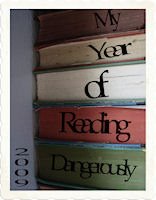SO sorry I'm late posting this month's prizes. For those of you who read my blog you know that I'm teaching college, and mid-term was a killer this time around. Without further ado, the prizes for February are:

"Slavery is terrible for men, but it is far more terrible for women," Harriet Jacobs wrote in 1861. At that time she was an escaped slave living in the north, but the Fugitive Slave Law of 1850 meant that she could not longer consider being in the northern states a guarantee of freedom or safety. Her book is an eloquent recital of the suffering that is slavery. Families broken apart; promises of freedom made but never kept; whippings, beatings, and burnings; masters selling their own children - all are recounted with precise detail and a blazing indignation.

A 101-year-old retired laborer who enrolled in a literacy class near his Dallas, Tex., home at the age of 98, George Dawson now reads and writes on a third-grade level. From Dawson's eloquent words, co-writer Glaubman, a Seattle elementary school teacher, has fashioned two engrossing stories. First is the inspiring saga of how someone who was the grandson of a slave managed to navigate the brutally segregated small Texas town of Marshall, where Dawson was born, without losing his integrity or enjoyment of life.
That's right...two great books--one of my favorites and one of Heather's--going out to two lucky Year of Reading Dangerously Participants. And the winners are!
Incidents:
LisaLife is So Good:
Kim L.Ladies, if you would, please send your contact info to estellabooks(at)gmail(dot)com.
If you've already read the book you were chosen for just let me know and I'd be happy to substitute another book, Blood Done Sign My Name, by Timothy Tyson.
 Proper discussion questions for March's book, Cat's Eye, will begin to appear below this post soon. Feel free to link your reviews via Mr. Linky below or link to any other "Dangerous" titles you review in March.
Proper discussion questions for March's book, Cat's Eye, will begin to appear below this post soon. Feel free to link your reviews via Mr. Linky below or link to any other "Dangerous" titles you review in March.

